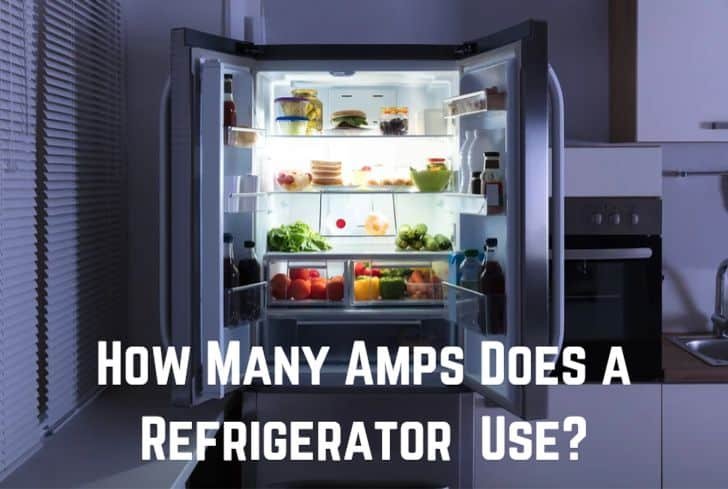A refrigerator typically uses around 2-3 amps of electricity. Refrigerators use this amount of amps to power the compressor and keep the food items cold.
Having a dedicated circuit for your refrigerator is crucial to prevent overloading and potential electrical hazards. It is recommended to consult with a licensed electrician to ensure that your refrigerator is properly connected to a dedicated circuit. This will not only ensure the efficient functioning of your refrigerator, but also enhance the safety of your electrical system.
Remember, a dedicated circuit will solely supply power to your refrigerator, minimizing the risk of interruptions or electrical issues caused by other appliances using the same circuit.
Understanding The Amp Usage Of A Refrigerator
Understanding the amp usage of a refrigerator is important in order to assess its power consumption. An amp, short for ampere, is a unit of electric current. It measures the flow of electricity through a circuit.
When it comes to power consumption, it’s essential to know how many amps a refrigerator uses. Refrigerators typically use around 2 to 3 amps per hour. However, this can vary depending on the size and model of the appliance.
In comparison to other household appliances, refrigerators tend to use less amps than devices like air conditioners or electric ovens, which can consume 15 to 20 amps. It’s important to note that the startup amps for a refrigerator may be higher than its average running amps.
Overall, understanding the amp usage of a refrigerator helps in determining its electrical requirements and ensuring that it operates efficiently without overloading circuits.

Credit: www.tcl.com
Factors Affecting The Amp Usage Of A Refrigerator
| Factors Affecting the Amp Usage of a Refrigerator |
| Size and capacity of the refrigerator: The size and capacity of a refrigerator play a significant role in determining its amp usage. Generally, larger refrigerators with more storage space consume more amps compared to smaller ones. |
| Efficiency rating and energy-saving features: Refrigerators with higher efficiency ratings and energy-saving features are designed to consume fewer amps. Look for refrigerators with ENERGY STAR certification to ensure optimal energy efficiency. |
| Age and condition of the refrigerator: Older refrigerators tend to use more amps as they may lack modern energy-saving technologies. Additionally, refrigerators in poor condition, such as refrigerant leaks or faulty compressors, may consume more amps than usual. |
| Environmental factors and usage patterns: Environmental factors like ambient temperature and humidity can affect the amp usage of a refrigerator. In hotter climates, refrigerators may work harder and consume more amps to maintain the desired temperature. Furthermore, frequent door openings and improper usage can also impact energy consumption. |
Please note that the amp usage of a refrigerator may vary depending on the specific make and model. It is recommended to refer to the manufacturer’s specifications or consult a professional electrician for an accurate assessment.
Calculating The Amps Required For A Refrigerator
Calculating the amps required for a refrigerator involves understanding its power rating and converting watts to amps. The power rating of a refrigerator can usually be found on a label or in the user manual. To convert watts to amps, you can use the formula Amps = Watts / Volts. For example, let’s say a refrigerator model has a power rating of 600 watts and operates on 120 volts. By using the formula, we can determine that it requires 5 amps to run. It’s important to note that different refrigerator models may have different power ratings and therefore require different amperages. The actual amps used by a specific refrigerator model can be determined by referring to its documentation or contacting the manufacturer.
Tips For Reducing The Amp Usage Of A Refrigerator
Proper placement and ventilation are crucial for improving efficiency. Make sure to place your refrigerator in a cool area away from heat sources such as ovens or direct sunlight. Additionally, ensure that there is enough clearance around the refrigerator for proper airflow.
Another tip is to adjust the temperature settings and defrosting frequency. Set the temperature to the recommended level and defrost the refrigerator regularly to prevent ice buildup.
Maintenance and cleaning are also important for optimizing performance. Keep the coils and vents clean to improve airflow and check the door seals for any leaks or cracks.
Lastly, consider upgrading to an energy-efficient refrigerator model. Look for models with an ENERGY STAR rating, which indicates higher energy efficiency.
Frequently Asked Questions For How Many Amps Does A Refrigerator Use?
Can I Run A Refrigerator On A 15 Amp Circuit?
Yes, you can run a refrigerator on a 15 amp circuit.
Is A Refrigerator On A 15 Or 20 Amp Circuit?
A refrigerator typically runs on a dedicated circuit, with either a 15 or 20 amp capacity.
How Many Amps Does A Fridge And Freezer Take?
A fridge and freezer typically use around 4-6 amps of electricity.
Does A Refrigerator Need A 30 Amp Breaker?
A refrigerator does not require a 30 amp breaker.
Conclusion
To conclude, understanding the amps required by a refrigerator is crucial for managing your home’s electrical system efficiently. It’s important to note that the amp usage of a refrigerator can vary based on factors such as size, brand, and model.
On average, a typical refrigerator uses around 2-3 amps. However, it’s always a good idea to check the manufacturer’s specifications for the true amp usage of your specific refrigerator. By knowing the amps required, you can ensure that you have the appropriate circuit and electrical setup to support the refrigerator’s needs.
Additionally, monitoring the energy consumption of your refrigerator can help you make informed decisions about your overall energy usage and potentially save on electrical costs. Overall, understanding the amp usage of your refrigerator is an important aspect of maintaining the efficiency and functionality of your home’s electrical system.

